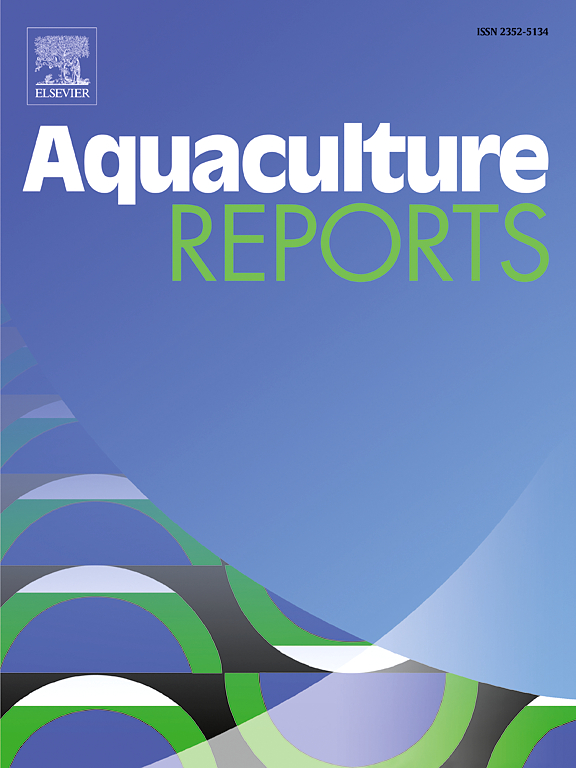Effects of branched-chain amino acids on starvation-induced macroautophagy and chaperone-mediated autophagy in common carp (Cyprinus carpio)
IF 3.7
2区 农林科学
Q1 FISHERIES
引用次数: 0
Abstract
Most fish experience starvation stress during overwintering, typically resulting in excessive protein degradation and muscle atrophy. Branched-chain amino acids (BCAAs), are important substrates for protein synthesis and play active roles in promoting muscle growth. Although BCAAs have received widespread attention for their role in autophagy regulation, their ability to alleviate starvation-induced damage via macroautophagy and chaperone-mediated autophagy (CMA) pathways remains unclear. In this study, common carp were starved for 7 or 14 days, then administered BCAAs alone via gavage at 1.25 g/kg for 14 days. Starvation induced muscle atrophy and autophagy-related structural changes in carp muscle. Supplementation with BCAAs helped restore normal tissue morphology. Macroautophagy-related (atg4b, atg12, and lc3) and CMA-related (hsp70 and lamp2a) gene expression was upregulated under starvation conditions. These genes were downregulated after supplementation with BCAAs, whereas p62 and gfap showed the opposite trend. At the protein level, LC3-II, lysosome-associated membrane protein 2A (LAMP2A), and heat shock protein 70 (HSP70) were upregulated after starvation and downregulated after supplementation with BCAAs, but P62 showed the opposite trend. In addition, branched-chain amino acid transaminase (BCAT) and branched-chain ketoacid dehydrogenase (BCKDH) enzyme activity assays revealed that supplementation with BCAAs significantly increased amino acid metabolism. Overall, supplementation with BCAAs reduced macroautophagy and CMA levels in carp muscle tissues during starvation stress, and enhanced metabolic utilization of BCAAs. This study provides valuable insights for developing nutritional strategies to reduce starvation-induced muscle atrophy. These findings may help improve fish health and flesh quality during overwintering or feed restriction in aquaculture.
支链氨基酸对饥饿诱导的鲤鱼巨噬和伴侣介导的自噬的影响
大多数鱼类在越冬期间经历饥饿压力,通常导致过度的蛋白质降解和肌肉萎缩。支链氨基酸(BCAAs)是蛋白质合成的重要底物,在促进肌肉生长中起着积极的作用。尽管BCAAs因其在自噬调节中的作用而受到广泛关注,但其通过巨噬和伴侣介导的自噬(CMA)途径减轻饥饿诱导损伤的能力尚不清楚。本研究将普通鲤鱼饥饿7 d或14 d,然后以1.25 g/kg的剂量单独灌胃给予BCAAs,持续14 d。饥饿诱导鲤鱼肌肉萎缩及自噬相关结构改变。补充支链氨基酸有助于恢复正常组织形态。饥饿条件下,巨噬相关(atg4b、atg12和lc3)和cma相关(hsp70和lamp2a)基因表达上调。这些基因在补充BCAAs后下调,而p62和gfap则呈现相反的趋势。在蛋白水平上,LC3-II、溶酶体相关膜蛋白2A (LAMP2A)和热休克蛋白70 (HSP70)在饥饿后上调,在补充BCAAs后下调,而P62则相反。此外,支链氨基酸转氨酶(BCAT)和支链酮酸脱氢酶(BCKDH)酶活性测定显示,添加BCAAs显著提高了氨基酸代谢。总体而言,补充支链氨基酸降低了饥饿应激期间鲤鱼肌肉组织的巨噬和CMA水平,并提高了支链氨基酸的代谢利用。该研究为制定营养策略以减少饥饿引起的肌肉萎缩提供了有价值的见解。这些发现可能有助于在水产养殖越冬或限饲期间改善鱼类健康和肉质。
本文章由计算机程序翻译,如有差异,请以英文原文为准。
求助全文
约1分钟内获得全文
求助全文
来源期刊

Aquaculture Reports
Agricultural and Biological Sciences-Animal Science and Zoology
CiteScore
5.90
自引率
8.10%
发文量
469
审稿时长
77 days
期刊介绍:
Aquaculture Reports will publish original research papers and reviews documenting outstanding science with a regional context and focus, answering the need for high quality information on novel species, systems and regions in emerging areas of aquaculture research and development, such as integrated multi-trophic aquaculture, urban aquaculture, ornamental, unfed aquaculture, offshore aquaculture and others. Papers having industry research as priority and encompassing product development research or current industry practice are encouraged.
 求助内容:
求助内容: 应助结果提醒方式:
应助结果提醒方式:


